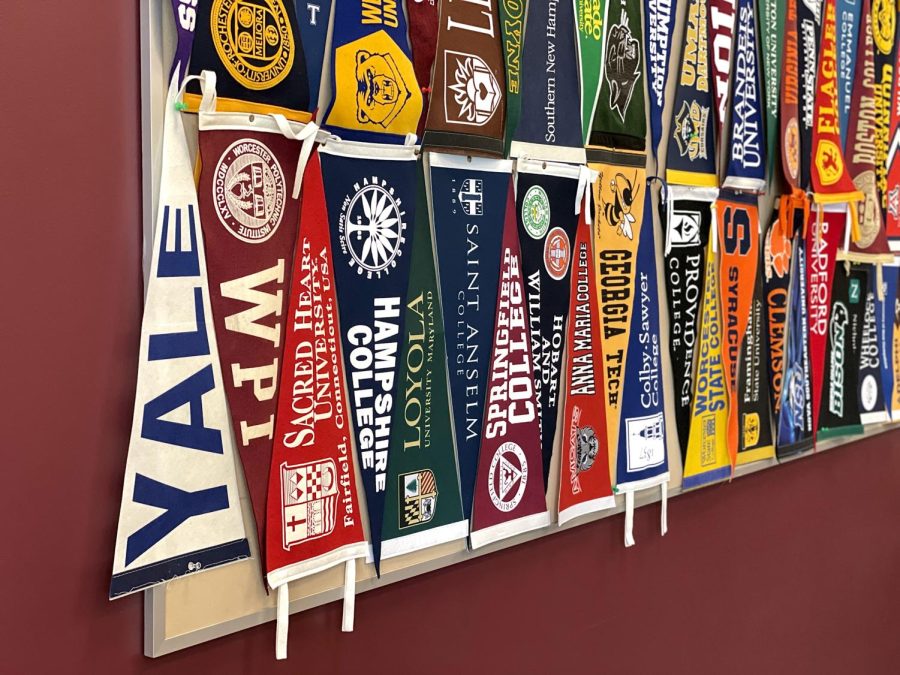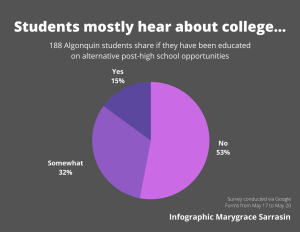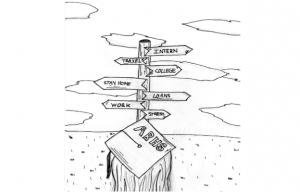Inside view on college planning process
The guidance department helps students navigate the college process at the Career Resource Center.
March 4, 2022
Many seniors have experienced the stress that comes with planning for college, and they are eager to share their advice to help younger students prepare.
Guidance workshops don’t begin until junior year, so many underclassmen don’t know what to expect. College planning follows a universal procession for juniors and seniors: researching colleges, taking standardized tests, securing recommendations, writing the 650-word personal essay, finalizing a college list, then filling out each lengthy application.
Guidance counselor Dave Breglio believes that his department works hard to prepare students for the process.
“We can’t force any student to go and explore colleges, so we try our best to put all the information out in workshops and then follow up with those students individually,” Breglio said.
The guidance department implements a program with students and their families to ensure that everyone is on the same page when it comes to the college planning process.
“The overall planning piece starts junior year,” Breglio said. “But we start to touch on it a little bit sophomore year because this is when we start to have kids think about what types of careers would be a good fit for their personalities, interests and strengths.”
Breglio also believes the college planning process may not always be exactly about colleges, and it can start all the way up to freshman year. Breglio believes that even course selections are a step toward planning for a student’s future.
“Planning what classes down the road may be a good fit for you and what your interests are is a key part of planning for the future,” Breglio said.
Senior Allyson McCormick says she managed her time well when it came to her planning for the college application process. She made sure to get an early start on certain tasks such as asking teachers for letters of recommendation.
“I know several people who waited really late in the year and had to get recommendations from teachers who they did not particularly want,” McCormick said. “So I would recommend getting an earlier start on that portion of the process.”
McCormick said that she read many sample college essays in her 2020-2021 AP Literature & Composition class. Then, she examined the feedback that the college admissions counselors provided. This helped her understand what colleges are looking for in an essay and applied that knowledge to her own writing.
“Although this was not something that I did independently to help myself prepare, I would say that it is likely one of the things that helped me most,” McCormick said.
McCormick recommends that students space out the process as much as they can, as she believes that the more time a person has to work on applications, the better a position they will be in later. She recommends taking a lot of time to research the details about various schools.
“I would say that when you begin the process, you may have no idea what you’re looking for in a school, and that’s alright,” McCormick said. “As you look at more schools and see what they have to offer, you will be able to see what parts you like and what you don’t, which will narrow down your search and make it less intimidating.”
Senior Emily Perry said she did not manage her time as well when it came to preparing for the college application process.
“To prepare, I didn’t do much besides thinking of locations and doing what guidance recommended in the workshop,” Perry said.
Perry recommends taking time to think about whether or not you want to go to college in-state or out-of-state. Deciding on possible school locations helped narrow down her options on where she wanted to go.
“Once I narrowed it down, I started looking at the schools in those areas and seeing the programs they had to offer and what I was interested in,” Perry said.
Perry wants students to know that applying to college will be stressful, and they have to understand that. But in the end, it is worth it.













